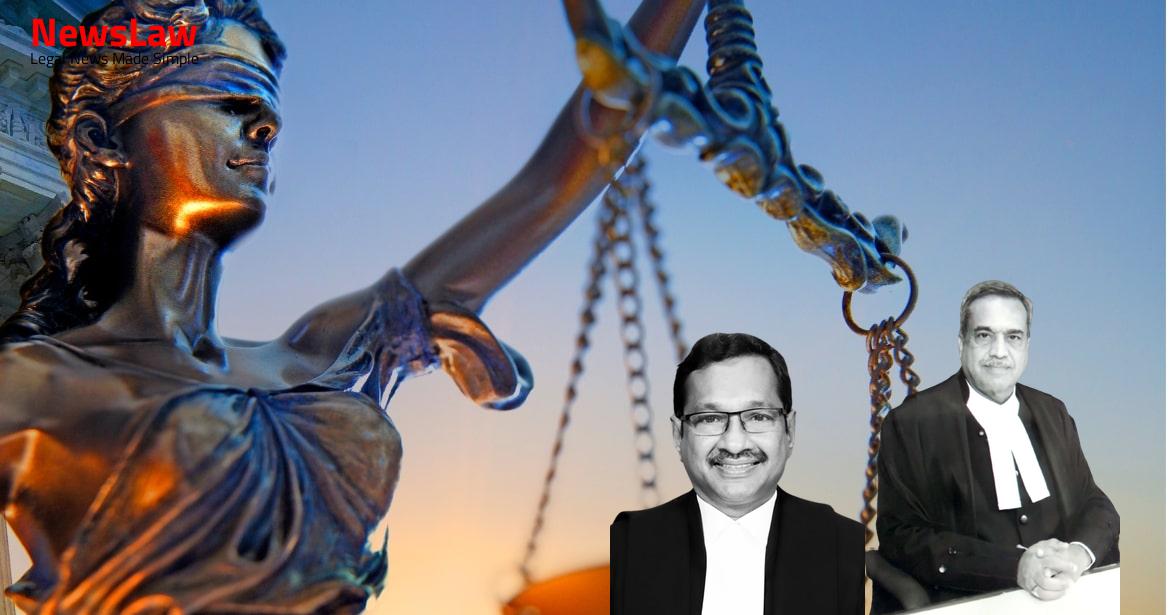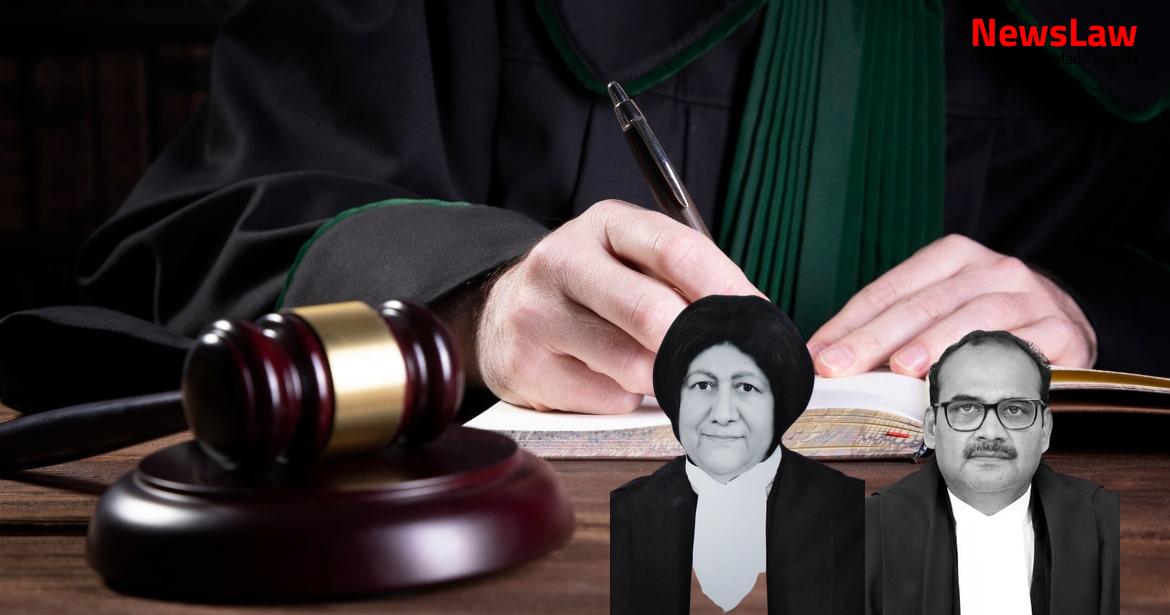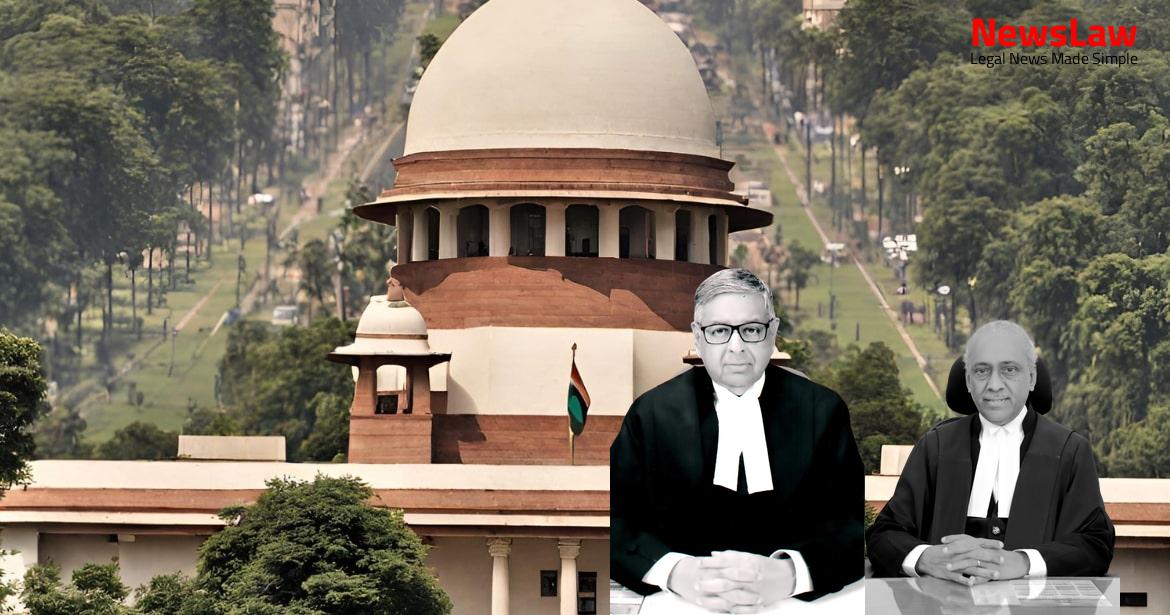Feeling aggrieved and dissatisfied with the impugned judgment and order dated 10.11.2021 passed by the High Court of Uttarakhand at Nainital in Writ Petition No 190/2020, by which the High Court has allowed the said writ petition preferred by respondent No.1 herein and has quashed and set aside the appointment of the appellant herein – original respondent No.5 as the Vice-Chancellor of Soban Singh Jeena University (hereinafter referred to as the ‘University’), original respondent No.5 – Vice-Chancellor of the said University has preferred the present appeal. The appointment of the appellant was challenged before the High Court by way of present writ petition, inter alia, on the ground that at the time when he was appointed as Vice-Chancellor, i.e., on 11.08.2020, he was not having the requisite experience of minimum 10 years as Professor, which was required as per the University Grants Commission Regulations, 2018 (for short, ‘UGC Regulations, 2018’) which were adopted by the State Government. It was also the case on behalf of the appellant that while serving as Member of the Public Service Commission, he was supervising PhD scholars and therefore the same was required to be counted for considering the minimum 10 years’ experience. 3 Feeling aggrieved and dissatisfied with the impugned judgment and order passed by the High Court, quashing, and setting aside the appointment of the appellant as Vice-Chancellor of the University, original respondent No.5 – Vice-Chancellor of the University has preferred the present appeal. 2 It is further submitted that as it was a case of appointment of the first Vice-Chancellor of the University, as per proviso to Section 10(1) of the University Act, 2019, it was open and permissible for the State Government to appoint a Vice-Chancellor of his choice and as it was a case of appointment of first Vice-chancellor, it was not required to have the name recommended by the Search Committee. 3 Shri Patwalia, learned Senior Advocate has further submitted that even otherwise it cannot be said that the appellant was not having requisite minimum 10 years’ experience as a professor.
Also Read: https://newslaw.in/supreme-court/quashing-of-high-court-judgment-on-land-acquisition-proceedings/
Anindya Sundar Das & Others, 2022 SCC Online SC 1382 is concerned, it is submitted by the learned counsel appearing on behalf of the appellant that the said decisions shall not be applicable to the facts of the case on hand, inasmuch as those were not the cases of appointment of first Vice-Chancellor. In support of the impugned judgment and order passed by the High Court, quashing and setting aside the appointment of the appellant as Vice-Chancellor of the University, Shri Sanjay Parikh, learned counsel has made the following submissions: i) that the UGC Regulations, 2018 were adopted by the State Government and Regulation 7.3.0 prescribes that for the post of Vice- Chancellor, a person must have minimum 10 years’ experience as a professor in any University and the appointment of the Vice- Chancellor of the University shall be by the Search Committee which will submit the panel of 3-5 persons and thereafter amongst those, appointment of the Vice-Chancellor can be made; ii) in the present case, the appellant admittedly was not having the requisite minimum 10 years’ teaching experience as Professor; iii) service rendered as Member of the Uttarakhand Public Service Commission cannot be considered for the purpose of experience as a professor because as a Member of the Public Service Commission he was not required to teach and therefore the service rendered as a Member of the Public Service Commission cannot be said to be having the experience in teaching; iv) having a lien on the post of professor while serving as a member of the Public Service Commission cannot be said to be having teaching experience; v Proviso to Section 10(1) of the University Act, 2019 does not give any unfettered powers to the State Government to appoint Vice-Chancellor of the University de hors Section 10 of the University Act, 2019 and UGC Regulations, 2018, which were adopted by the State Government; vi) UGC Regulations, 2018 including Regulation 7.3.0 for appointment of the Vice-Chancellor have been specifically adopted by the State Government except the requirement of consideration of the Search Committee; vii) neither there was any advertisement given nor the applications were invited from eligible and meritorious candidates nor the name of the appellant was recommended by the Search Committee as the Search Committee was not constituted at all and therefore the name of the appellant was not recommended by the Search Committee; viii)in view of Article 319 of the Constitution of India, the appellant could not have worked on any other post in any other institution while continuing as a member of the Public Service Commission and therefore the submission on behalf of the appellant that while the appellant was a member of the Public Service Commission, his lien was continued and/or that he was supervising the Ph.D. Patwalia, learned Senior Advocate appearing on behalf of the appellant – Vice-Chancellor of the University has made an alternative submission that in case this Court is of the opinion that the impugned judgment and order passed by the High Court quashing and setting aside the appointment of the appellant as Vice- Chancellor of the University is not required to be interfered with, in that case, the appellant proposes to resign and therefore he may be permitted to resign as Vice-Chancellor of the University.
(1) The Vice-Chancellor shall be appointed by the Chancellor with the concurrence of the State Government from among the distinguished persons in the field of study of the University or from equivalent position in Administration, Industry or Research Institute whose names are submitted to him by search committee constituted by the State Government in accordance with the provisions of sub-section (2). (3) Based on the qualification and eligibility prescribe in the regulations of the University Grant Commission, the committee shall prepare a panel of three persons who shall be suitable for the post of the Vice-Chancellor.
While preparing the panel, the Search cum- Selection Committee shall give proper weightage to the academic excellence, exposure to the higher education system in the country and abroad, and adequate experience in academic and administrative governance, to be given in writing along with the panel to be submitted to the Visitor/Chancellor.
It is not in dispute that UGC Regulations, 2018 have been adopted by the State Government vide GO dated 6.9.2019 and Regulation 7.3.0 of Regulations, 2018 has been specifically adopted with a modification that the process of selection of Vice-Chancellor needs to be adopted but selection committee and search committee would be constituted as per the prevalent provisions of the Act at that point of time. As per Section 10(1), the Vice-Chancellor shall be appointed by the Chancellor with the concurrence of the State Government from among the distinguished persons in the field of study of the University or from equivalent position in Administration, industry or Research Institute whose names are submitted to him by search committee constituted by the State Government in accordance with the provisions of sub-section (2). Section 10(3) of the University Act, 2019 provides that based on the qualification and eligibility prescribe in the regulations of the University Grant Commission, the committee shall prepare a panel of three persons who shall be suitable for the post of the Vice-Chancellor. On conjoint reading of the aforesaid provisions, the selection for the post of Vice-Chancellor should be through proper identification by a panel of 3-5 persons by a Search-cum-Selection Committee and the Vice- Chancellor shall be appointed out of the panel of the names recommended by the Search-cum-Selection Committee.
It is the case on behalf of the appellant and the University and the State that as it was a case of appointment of first Vice-Chancellor and therefore considering proviso to Section 10(1) of the University Act, 2019, the procedure as required for appointment as Vice-Chancellor as provided under Section 10 is not required to be adhered to and it is open for the State Government to appoint the first Vice-Chancellor of the University. (supra), is a very important post and therefore the most meritorious person should be appointed as Vice-Chancellor of the University from and amongst the other eligible meritorious candidates out of the panel of the names recommended by the Search-cum-Selection Committee. It is to be noted that the post of Vice-Chancellor of the university is a very important post so far as the university is concerned. While discussing the duties of a Vice-Chancellor, the Commission stated that a Vice-Chancellor must be the chief liaison between the university and the public and must be a keeper of the university’s conscience, both setting the highest standard by example and dealing firmly and promptly with indiscipline and malpractice of any kind. While the Chancellor of a university may be a high dignitary of the State of the Union of India or an eminent scholar or eminent person in public life of the State, the appointment of Vice-Chancellor, being the important functionary of the university is most strategic.
Gnanam (also called as the Gnanam Committee Report, 1990) accentuated the role of a Vice- Chancellor, stating that the Vice-Chancellor should be a person with vision and qualities of academic leadership and with a flair for administration because what the universities need is a sensitive, efficient, fair and bold administrator. Singh, the then Chairman of University Grants Commission and former Director of National Assessment and Accreditation Council (“NAAC”): “As Chief Executives and Academic Heads of Universities, the Vice- Chancellors are expected to be efficient and effective in terms of: ( a ) Implementation of National Higher Education Policy and programmes, ( b ) Institutional change in tune with the national reforms package, ( c ) Quality and innovation enhancement and their sustainability, ( d ) Productive engagement with ‘communities of scholars’ from within their universities and from national and international domains, ( e ) Nurturing of ‘Research and Innovation Ecosystem’ and translation of deliverables to society and economy, ( f ) Adoption of international best practices of ‘Good Governance’.”
Also Read: https://newslaw.in/supreme-court/final-decision-and-disclosure-in-collegium-meetings/
Thus, universities are autonomous and the Vice-Chancellor is the leader of a higher education institution.
At this stage, it is correct to say that a Vice-Chancellor is the kingpin of a university’s system and a keeper of the university’s conscience.”
Thus, considering the aforesaid relevant provisions, a Vice- Chancellor should have a minimum teaching experience of 10 years as a Professor in the University and his name should be recommended by the Search-cum-Selection Committee and the appointment of the Vice- Chancellor is to be made out of the panel recommended by the Search- cum-Selection Committee.
At this stage, it is required to be noted that even as per Section 10(3) of the University Act, 2019, based on the qualification and eligibility prescribe in the regulations of the University Grant Commission, the committee shall prepare a panel of three persons who shall be suitable for the post of the Vice-Chancellor. Therefore, the contention on behalf of the appellant that the period spent by the appellant from 7.10.2017 to 13.08.2020 as a member of the Public Service Commission should be added to his teaching experience, holding lien on the substantive post, cannot be accepted. Thus, as rightly observed by the High Court, the appellant was not having the required/requisite minimum 10 years’ teaching experience as a Professor in the University, which is the requirement under the UGC Regulations, 2018. As observed hereinabove, UGC Regulations, 2018 were adopted by the State Government and the State Government was otherwise bound to follow and/or act as per the UGC Regulations, 2018.
As observed hereinabove, and as per the requirement of Regulation 7.3.0 of the UGC Regulations, 2018 and even as per Section 10 of the University Act, 2019, the selection for the post of Vice-Chancellor should be through proper identification by a panel of 3-5 persons by Search-cum-Selection Committee and the members of such Search-cum-Selection Committee shall be the persons of eminence in the sphere of higher education and shall not be connected in any manner with the University concerned or its colleges. In view of the above, the High Court has rightly quashed and set aside the appointment of the appellant as Vice-Chancellor of the University. Now so far as the prayer on behalf of the appellant that the appellant is ready and willing to resign as Vice-Chancellor of the University is concerned, the appellant may resign as Vice-Chancellor, if so advised.
Case Title: PROF NARENDRA SINGH BHANDARI Vs. RAVINDRA JUGRAN (2022 INSC 1198)
Case Number: C.A. No.-008184-008184 / 2022



